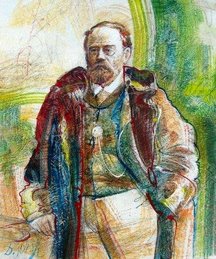On Sunday evening, the French voters have to choose definitively their mayors. It's the run-off or the second round of the mayoral elections, which throw some trouble upon the forums and debates, since the last ballot evening. As a matter of fact, the rosy wave or the huge socialist wave, which has been announced widely in the media, didn't reach the beach of the mainstream media where one may wait for the great evening or the victory of the left wing.
Actually, the Socialist Party won the mayoral elections. But the leftists couldn't reach the national level of a referendum, which might have denounced the government of France by Sarkozy's policy. The ballot was confined to some local policy and drama. So, this little consequence of the ballot should become the strongest reason of the rightists for maintaining their tough line of policy launched by the Prime Minister Fillon's government.
Abroad, the whole international press and media express harsh criticism against Sarkozy. Obviously, the French people castigate widely their president. Meanwhile, one can read the same words of mockery surging in the newspapers from London to New York. Nevertheless, these voices of harsh criticism don't mean some real expression of the widest electorate in France. Thus, the rightist part of the electorate is quite fencing at such a level of skill that one could see easily they have greatly lowered the victory of the socialist party.
Besides, nobody could say where the MoDem (the Democratic Movement) or the centrist party of Francois Bayrou is really working. Sometimes the centrists back naturally the rightist contenders and winners, for the Center is traditionally a rightist party. On the other hand, some centrist contenders are courting the leftist candidates in local races for mayoralty, although the leftist ignore them arrogantly. For example, the mayor of Paris, Bertrand Delanoe, rejected immediately De Sarnez's proposals of a center-left union.
Thus, the first victim of the mayoral election is obviously MoDem. For the centrists get polls rating at so weak a level at 3 percent that nobody believes the centrists could surge again toward victory in the presidential elections in 2012. This means the complete defeat of Bayrou's ideology and policy of strict or tough centrist line against the two-headed eagle in the right-left parliament, and toward a new device in the French political theater. In fact, the old and traditional partition of the assembly remains the model that has greatly lowered and, unfortunately, has removed the new centrist party or the MoDem.
Besides, in the great cities of France, the ballot is turning again into some harsh and cynical battle between the right wing and the left wing. Marseille, Lyon and Strasbourg are the theater of a battle wherein the MoDem plays only the character of a flunky or a valet serving the great and lofty princes of national policy. This play evokes greatly the strategy of the far right party, the National Front at a time when Jean-Marie Le Pen was an active and turbulent actor in the French politics drama.
The second great news of the ballot is the complete defeat of the far right front. Moreover, this means a great victory for Nicolas Sarkozy, who finally has been able to reduce this extremist party, when no one could reduce it before Sarkozy's strategy. Probably, one should acknowledge that nobody wanted really to reduce the National Front, so useful when it diffused fear and played dirty tricks in the political theater. Finally, the defeat of the National Front is the evidence of the great return of the frank and neat opposition between the two traditional camps, the right wing and the left wing.
This sounds like the comeback of the traditional apparatus in French democracy widely announced by the mayoral elections and their local races. The two major camps within the national assembly may be clearly rebuilt again and maybe for the decades to come. Actually, one can see that leftists get some difficulties when they want to elect their chief or their main contender, among the so-called "elephants," so jealous and powerful. On the contrary, the rightist have already their young and too powerful chief, who looks like a pop star of politics and the very French lover of the glamorous Carla Bruni. Perhaps this is the reason why the rightist party governs France today, before and after the mayoral elections.
On Sunday evening, both rightists and leftists will run in the race for the next presidential elections in 2012. Finally, the National Front is out and the MoDem appears now as some marginal political force without any possibility of winning the presidency in 2012.
Monday, March 17, 2008
Sunday, March 09, 2008
French citizens set to exact revenge
On Sunday evening in France, 36,683 mayors and half a million municipal councilors will be elected. The municipal elections are a two-ballot challenge. And this race is suddenly turning into a kind of referendum on France's out of favor president, Nicolas Sarkozy. Some have called Sarkozy the hyperpresident because one can see him in every theater of politics, and assuredly as one of the top topics in the mainstream media day by day.
Sarkozy is widely mocked by average people, who call him President Bling-Bling. This expression stresses his snobby style of consorting with his flashy jet set billionaire friends. Meanwhile, Sarkozy is fond of frank debate with the very popular or ordinary citizenry. Recently, he has been widely shown, first on the Internet then on TV, swearing at an ordinary visitor at the greatest annual farmers' market in Paris. Though the man harshly provoked Sarkozy, the press fell easily into a kind of fake deep-throat contest based on gossip, turning this little story into a huge and grotesque state of affair.
Actually, according to Denis Muzet, a media analyst and sociologist at the Sorbonne University in Paris, "People are very disillusioned and they are going to punish him." Certainly, some dull and gloomy revenge seems to have infected the spirit of frustrated Frenchmen and Frenchwomen who crave a better welfare and lifestyle.
As one can see, Sarkozy's stature seems to have fallen. Last spring, he enjoyed sky-high approval ratings in polls. Nowadays, he has fallen to such a degree of disapproval that he has finally acknowledged that he has made some mistakes. Interviewed by the right-of-center Le Figaro, Sarkozy boldly said, "I am not exonerating myself of anything."
As a matter of fact, every would-be master of politics in France has to survey and scrutiny his popularity in the local practice of his mayoral function because any member of France's National Assembly is certainly and firstly a mayor. Sarkozy too began his presidential ascension by this very first step of holding a mayoralty, which helped to build his magnificent political career, in the chic city of Neuilly in the green belt of Paris.
Around the ballot days, Prime Minister Francois Fillon plays it louder in the forefront of the UMP's (Union for a Popular Movement's) campaign, while Sarkozy wisely becomes more discreet. In fact, Fillon surges in the polls over his president and commander. Although it is quite astonishing that Fillon gets some louder applause than Sarkozy. Both have expressed the same policy, because they lead their own government. Thus, one has to understand Sarkozy's bad polls only as some personal revenge.
Nevertheless, the center-right party UMP, the president's party, faces a battle to hold on to power in the main cities in France. After a century of rightist leadership, Bertrand Delanoe, of the Socialist Party, won the mayoralty in Paris in 2001. Now, he may gain a very prestigious second term in his race against Francoise de Panafieu, the female candidate of the UMP. In the same time, he may win the leadership of the whole opposition and firstly in the Socialist Party from Segolene Royal the former socialist contender in the 2007 presidential election.
Besides, in Strasbourg, Fabienne Keller will probably surrender her seven-year mayoralty to the socialists. In France's second-largest city, Marseille, 68-year-old Jean-Claude Gaudin is about to lose his shrewd and steadfastly held 13-year mayoralty. So, one can easily predict some great and smashing political events, with harsh criticism in debates on TV, on Sunday evening during the first ballot.
In Bordeaux, former Prime Minister Alain Juppe, 62, campaigns without the UMP's logo on his Web site, which is a personal blow against Sarkozy. And Xavier Darcos, the Education Minister, may lose the race for the mayoralty in Perigueux, despite the personal backing of Sarkozy, who made a rare speech in the city hall magnificently but vainly supporting the famous UMP contender.
According to Vincent Tiberj, an analyst at the Paris National Institute for Political Sciences, "It will be a referendum on the president." But the president maintains his tough line because the local voting can't erode his party's majority in the National Assembly. This is why Sarkozy recently said, "The Municipal Elections won't have any impact on the political platform chosen by the French."
Fillon has said, "We can't afford a pause. After the municipal elections, we will instead accelerate."
There are higher stakes in this challenge for Francois Bayrou, the creator of the new centrist party, MoDem (the Democratic Movement), which is not a real or traditional party. The MoDem is a social movement. Bayrou is hoping that a new political class will emerge in the middle of the traditional opposition of the rightist and leftist camps. He is slowly preparing for the 2012 presidential election.
Sarkozy is widely mocked by average people, who call him President Bling-Bling. This expression stresses his snobby style of consorting with his flashy jet set billionaire friends. Meanwhile, Sarkozy is fond of frank debate with the very popular or ordinary citizenry. Recently, he has been widely shown, first on the Internet then on TV, swearing at an ordinary visitor at the greatest annual farmers' market in Paris. Though the man harshly provoked Sarkozy, the press fell easily into a kind of fake deep-throat contest based on gossip, turning this little story into a huge and grotesque state of affair.
Actually, according to Denis Muzet, a media analyst and sociologist at the Sorbonne University in Paris, "People are very disillusioned and they are going to punish him." Certainly, some dull and gloomy revenge seems to have infected the spirit of frustrated Frenchmen and Frenchwomen who crave a better welfare and lifestyle.
As one can see, Sarkozy's stature seems to have fallen. Last spring, he enjoyed sky-high approval ratings in polls. Nowadays, he has fallen to such a degree of disapproval that he has finally acknowledged that he has made some mistakes. Interviewed by the right-of-center Le Figaro, Sarkozy boldly said, "I am not exonerating myself of anything."
As a matter of fact, every would-be master of politics in France has to survey and scrutiny his popularity in the local practice of his mayoral function because any member of France's National Assembly is certainly and firstly a mayor. Sarkozy too began his presidential ascension by this very first step of holding a mayoralty, which helped to build his magnificent political career, in the chic city of Neuilly in the green belt of Paris.
Around the ballot days, Prime Minister Francois Fillon plays it louder in the forefront of the UMP's (Union for a Popular Movement's) campaign, while Sarkozy wisely becomes more discreet. In fact, Fillon surges in the polls over his president and commander. Although it is quite astonishing that Fillon gets some louder applause than Sarkozy. Both have expressed the same policy, because they lead their own government. Thus, one has to understand Sarkozy's bad polls only as some personal revenge.
Nevertheless, the center-right party UMP, the president's party, faces a battle to hold on to power in the main cities in France. After a century of rightist leadership, Bertrand Delanoe, of the Socialist Party, won the mayoralty in Paris in 2001. Now, he may gain a very prestigious second term in his race against Francoise de Panafieu, the female candidate of the UMP. In the same time, he may win the leadership of the whole opposition and firstly in the Socialist Party from Segolene Royal the former socialist contender in the 2007 presidential election.
Besides, in Strasbourg, Fabienne Keller will probably surrender her seven-year mayoralty to the socialists. In France's second-largest city, Marseille, 68-year-old Jean-Claude Gaudin is about to lose his shrewd and steadfastly held 13-year mayoralty. So, one can easily predict some great and smashing political events, with harsh criticism in debates on TV, on Sunday evening during the first ballot.
In Bordeaux, former Prime Minister Alain Juppe, 62, campaigns without the UMP's logo on his Web site, which is a personal blow against Sarkozy. And Xavier Darcos, the Education Minister, may lose the race for the mayoralty in Perigueux, despite the personal backing of Sarkozy, who made a rare speech in the city hall magnificently but vainly supporting the famous UMP contender.
According to Vincent Tiberj, an analyst at the Paris National Institute for Political Sciences, "It will be a referendum on the president." But the president maintains his tough line because the local voting can't erode his party's majority in the National Assembly. This is why Sarkozy recently said, "The Municipal Elections won't have any impact on the political platform chosen by the French."
Fillon has said, "We can't afford a pause. After the municipal elections, we will instead accelerate."
There are higher stakes in this challenge for Francois Bayrou, the creator of the new centrist party, MoDem (the Democratic Movement), which is not a real or traditional party. The MoDem is a social movement. Bayrou is hoping that a new political class will emerge in the middle of the traditional opposition of the rightist and leftist camps. He is slowly preparing for the 2012 presidential election.
Sunday, March 02, 2008
Rebellion surges against Sarkozy in France
In a few days, the French electorate will elect their mayors in every town. Actually, this ballot day will be a great challenge for President Nicolas Sarkozy because the polls are greatly lowering his popularity. Throughout the Web, a great tempest of insurrection is blowing up against the young president.
Some have said that Sarkozy is turning toward a return of monarchy in France. Around the "Palais de l'Elysee," the whole political gentry become characters in some bad movie or novella widely broadcast by the tabloids and the mainstream media. Moreover, Sarkozy's secret wedding to Carla Bruni, the model-turned-singer, stressed even more the political glamour in the media.
Journalists are now expressing more and more harsh criticism mixed with jealousy against Sarkozy, and very openly in TV debates. During the last few weeks, every issue publicly or privately expressed by Sarkozy was totally rejected and criticized by journalists and intellectuals, day by day. Assuredly, it's the first real opposition surging against Sarkozy. Sometimes it looks as if an anonymous mob is increasing in size throughout the very popular layers of the French citizenry.
On the other hand, Carla Bruni-Sarkozy is so cute a woman that she gives France a new flashy and sexy prestige, especially abroad. For example, Carla was acclaimed like a cult rock star in South Africa. Her discreet and graceful mood obviously increases her great power of seduction.
Of course, the riot against Sarkozy on the Web has no consequence in the real world. Nevertheless, one can see that neither protest nor rebellion will happen in the streets of Paris. It remains a verbal protest. We can see the extreme protest as an expression of a desire or a phantasm. Certainly, French citizens want amelioration of their lifestyle, but they want political stability too.
Actually, this rebellion surges within the leftist or socialist party, which lost the presidential election in 2007. This great frustration seems the very reason of the turmoil. Moreover, the usually anonymous mood of expression on the Web favors extreme political issues. For instance, nowadays in France one can commonly find people threatening the life of the president himself in what they write.
Thus, the personalities and fate of John F. Kennedy and his wife Jacqueline Bouvier are mainly evoked on the Web. It looks as if whole of France's electorate wants to fall into some great romance with a stressing, dramatic and sensational end. At the same time, Frenchmen and Frenchwomen accuse the author of this magnificent romance, who is Sarkozy himself.
Finally, one can see the gap between the Web -- including the mainstream media -- and the real world as a new statement in the French society. With such a degree of schizophrenia in the media and political issues, the results of the upcoming elections seem totally unpredictable.
The candidates and mayors of the UMP, the center-rightist party of Sarkozy, could win after Sarkozy's recent campaign of victimization. Remember the 2007 presidential election. The whole Web of opinion and the electorate throughout the media had announced the victory of the socialist Segolene Royal or the victory of the centrist candidate Francois Bayrou, well known as the "third man." In the end, Sarkozy won the election. The opposition parties and electorate deceived themselves and that frustration is blowing up now.
Some have said that Sarkozy is turning toward a return of monarchy in France. Around the "Palais de l'Elysee," the whole political gentry become characters in some bad movie or novella widely broadcast by the tabloids and the mainstream media. Moreover, Sarkozy's secret wedding to Carla Bruni, the model-turned-singer, stressed even more the political glamour in the media.
Journalists are now expressing more and more harsh criticism mixed with jealousy against Sarkozy, and very openly in TV debates. During the last few weeks, every issue publicly or privately expressed by Sarkozy was totally rejected and criticized by journalists and intellectuals, day by day. Assuredly, it's the first real opposition surging against Sarkozy. Sometimes it looks as if an anonymous mob is increasing in size throughout the very popular layers of the French citizenry.
On the other hand, Carla Bruni-Sarkozy is so cute a woman that she gives France a new flashy and sexy prestige, especially abroad. For example, Carla was acclaimed like a cult rock star in South Africa. Her discreet and graceful mood obviously increases her great power of seduction.
Of course, the riot against Sarkozy on the Web has no consequence in the real world. Nevertheless, one can see that neither protest nor rebellion will happen in the streets of Paris. It remains a verbal protest. We can see the extreme protest as an expression of a desire or a phantasm. Certainly, French citizens want amelioration of their lifestyle, but they want political stability too.
Actually, this rebellion surges within the leftist or socialist party, which lost the presidential election in 2007. This great frustration seems the very reason of the turmoil. Moreover, the usually anonymous mood of expression on the Web favors extreme political issues. For instance, nowadays in France one can commonly find people threatening the life of the president himself in what they write.
Thus, the personalities and fate of John F. Kennedy and his wife Jacqueline Bouvier are mainly evoked on the Web. It looks as if whole of France's electorate wants to fall into some great romance with a stressing, dramatic and sensational end. At the same time, Frenchmen and Frenchwomen accuse the author of this magnificent romance, who is Sarkozy himself.
Finally, one can see the gap between the Web -- including the mainstream media -- and the real world as a new statement in the French society. With such a degree of schizophrenia in the media and political issues, the results of the upcoming elections seem totally unpredictable.
The candidates and mayors of the UMP, the center-rightist party of Sarkozy, could win after Sarkozy's recent campaign of victimization. Remember the 2007 presidential election. The whole Web of opinion and the electorate throughout the media had announced the victory of the socialist Segolene Royal or the victory of the centrist candidate Francois Bayrou, well known as the "third man." In the end, Sarkozy won the election. The opposition parties and electorate deceived themselves and that frustration is blowing up now.
Subscribe to:
Comments (Atom)







